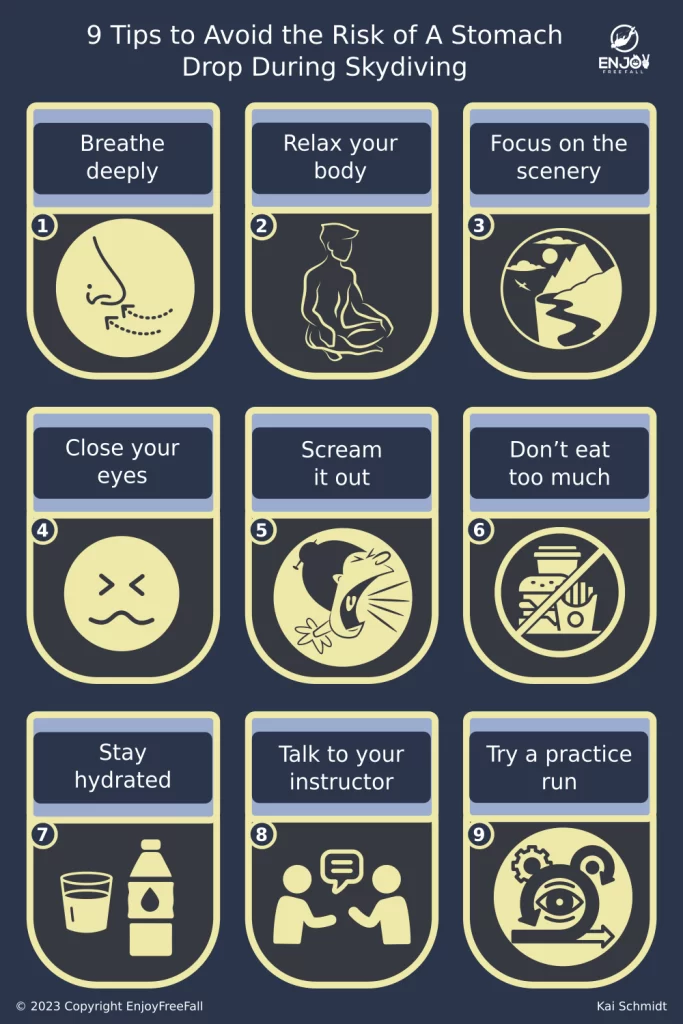
This blog post reveals the truth about the common misconception about stomach drops during skydiving, as well as the physical and emotional sensations you can expect during this thrilling experience. Get ready to have your expectations turned upside down!
As a general rule, skydiving does not cause a stomach drop sensation since the acceleration is not strong enough. Stomach drops are normally caused by sudden changes in speed, such as on rollercoasters. However, some first-time skydivers reported feeling a stomach drop due to extreme anxiety.
In the following, I explore in more detail why stomach drop sensation is not typical during a skydive, and how to avoid it if you’re feeling nervous. I also discuss the differences between first-time tandem and first-time solo skydiving, as well as activities that are often associated with a stomach drop sensation, to help you prepare for your upcoming adventure.
Why People Usually Do Not Experience a Stomach Drop During Skydiving
There are two main reasons why people feel a drop in their stomachs in general. The first is due to a drastic acceleration of speed, like when riding a rollercoaster or accelerating a car extremely fast. The second reason is if someone is highly nervous or receives bad news such as negative feedback or criticism, or hears that a loved one has been in an accident.
The Acceleration Rate During Skydiving Is Not High Enough to Create a Stomach Drop Sensation
When the body experiences acceleration, the sudden change in speed affects the stomach and intestines, which are among the most loosely held organs in the body. They are more easily affected by weightlessness than other organs and are moved during acceleration.
Even a small move of the stomach can lead to the feeling of a drop in the stomach. It might sound crazy but this is exactly what happens when riding a rollercoaster. When you go from 0 to 200 mph in just a few seconds, the acceleration causes your stomach to move “around” i.e. being pushed to the back, resulting in the stomach drop sensation.
You also might know the feeling of a stomach drop from riding free-fall towers, in which riders are lifted up high and then dropped quickly. The same principle applies here, with the difference that your stomach is pushed up.
While acceleration is also present in skydiving, it’s not as strong as on a rollercoaster. You are already moving when being in an aircraft, hence your acceleration when leaving the aircraft is not as strong anymore. In addition, the average speed during freefall is much lower (~120 mph) than on most rollercoasters.
Do you want to know more about the average falling speed of tandem skydives and how to increase it? Check out this guide and get ready to reach new heights of excitement!
Additionally, there is also a limit on how fast skydivers can fall, which is called terminal velocity. At terminal velocity, you no longer accelerate at all. As a result, acceleration during a skydive is often longer and more sustained than e.g., on a rollercoaster.
Another reason that people don’t typically feel a drop in their stomachs during skydiving is that they don’t have any anchor points around them in the air. Without any fixed points of reference, it’s harder for the body to perceive acceleration. Novice skydivers are often surprised that skydiving often feels more like flying than falling.
The Reason Why People Feel a Stomach Drop Upon Receiving Bad News
When your body experiences stress, whether from bad news or just feeling nervous, it can trigger a flight or fight response. This response is an evolutionary mechanism that prepares your body to either flee from danger or stand and fight.
During this response, your heart rate increases, and your muscles tense up, ready for action. But one of the effects of this response can also be a strong feeling in your stomach.
This feeling is caused by cortisol spikes in your body, which trigger a withdrawal of blood from the stomach. The blood is needed elsewhere in the body to help you perform at your best during a perceived threat. This can lead to a sense of emptiness or a dropping sensation in the stomach.
Why Do Some Novice Skydivers Experience a Drop in the Stomach?
Novice skydivers may feel a drop in their stomachs during skydiving due to the flight or fight response of their body caused by extreme nervousness or anxiety. The feeling is less common for experienced skydivers and also barely happens to novice skydivers.
If you experienced a stomach drop during your skydive, it is important to remember that this is not a concerning reaction of the body. After all, skydiving is a scary (and empowering) experience that rightfully invokes anxiety in you.
I still remember my first solo skydive, I was really nervous and afraid. As the plane took off and ascended to new altitudes, I could feel my anxiety building. I couldn’t help but think about all the what-ifs and scenarios that could go wrong. But once it was time to jump, I took a deep breath and went for it.
The sensation of freefalling through the air was incredible, and I felt a rush of adrenaline and excitement that I’ll never forget. When I deployed the parachute, it was like a moment of pure relief and elation. Looking out over the beautiful landscape from above was an experience unlike any other.
In the end, I felt an immense sense of accomplishment and pride for pushing past my fears and trying something new. Skydiving may have been scary at first, but it was also an unforgettable adventure. At that moment I knew that I would pick skydiving as a hobby.
Did you know that skydiving can help you overcome fears and boost your confidence in everyday life? Or that it can enhance your resilience and creativity? If you want to know more about these and other unexpected benefits of skydiving as a hobby check out this post.
Even though I did not experience a stomach drop during my first solo skydive, I experienced one during my first tandem skydive. The parachute had already been deployed and I and my instructor were gliding through the air.
Then my instructor performed a maneuver that involved flying in a horizontal loop. I suddenly felt a drop in my stomach due to the acceleration and disorientation. I was also a bit afraid because of the spinning. Despite the momentary discomfort, the experience was still exhilarating and unforgettable.

Nine Tips to Avoid the Risk of A Stomach Drop During Skydiving
If you’re concerned about experiencing a stomach drop because you are anxious and afraid before your first skydiving, that’s completely normal. It’s natural to feel a bit nervous before trying something new and exciting. But with these tips and a little bit of practice, you can learn to manage those feelings and enjoy your skydiving experience to the fullest.
- Breathe deeply: Taking slow, deep breaths can help calm your nerves and reduce the feeling of a stomach drop. As I explained previously, the stomach drop sensation can be caused by the fight or flight response of your body. If you normalize your breathing, the flight or fight response is more unlikely to be issued.
- Relax your body: Tensing up can increase the sensation of a stomach drop, so try to keep your body loose and relaxed.
- Focus on the scenery: Distract yourself by looking at the beautiful scenery around you, rather than focusing on the sensation in your stomach. If you want to have inspiration for the best places to enjoy a beautiful scenery, make sure to read my article about the 15 best wingsuit places in the US. Even though it focuses on wingsuit flying, most of the places offer traditional skydiving as well.
- Close your eyes: If you’re feeling overwhelmed, closing your eyes can help reduce the feeling of a stomach drop.
- Scream it out: While it might seem counterintuitive, letting out a scream can actually help reduce the sensation of a stomach drop. Screaming can help release built-up tension and anxiety, allowing you to feel more relaxed and calm. It’s also a way to express your emotions and let out any pent-up feelings you may have. Some people find that letting out a scream before or during a skydiving experience can help them feel more in control and less anxious.
- Don’t eat too much: Eating a heavy meal before an activity can increase the feeling of a stomach drop, so stick to lighter foods.
- Stay hydrated: Drinking water can help keep you calm and reduce the feeling of a stomach drop.
- Talk to your instructor: If you’re feeling nervous, talking to your instructor can help alleviate your fears and make you feel more comfortable.
- Try a practice run: Doing a practice run or simulation before the actual activity can help you get used to the feeling and will also calm your nerves.
How Does The Stomach Feel For Most People While Skydiving?
There is a range of subjective feelings that people can experience in their stomachs while skydiving. Some may feel butterflies in their stomach due to their excitement, others might tense their belly, while some do not even recognize any feeling in their stomach due to a sensory overload.
The feeling in your stomach can vary greatly from person to person. For some, the feeling of butterflies in the stomach starts when they board the aircraft, and increases as the jump approaches.
However, once the jump is made, the sensations can be so intense that the stomach feeling becomes secondary. Skydiving causes a sensory overload that can make it difficult to distinguish individual sensations, including the feeling in your stomach.
Speaking of sensory overload, skydiving gives different feelings that are difficult to fully capture and comprehend. If you’d like to learn more and shed light on this phenomenon, read my article about the 7 true feelings of skydiving. In this article I summarized and solved the biggest myths about the true skydiving feelings.
While jumping, the focus is primarily on the moment, allowing daily concerns to fade into the background. As a result, many people feel a sense of relief in their stomachs after the jump.
Others may experience a feeling of empowerment, which can lead to a positive sensation in the stomach. However, it’s important to note that some people may experience the opposite, feeling a drop in their stomach due to fear or nervousness.
Overall, the sensation in your stomach while skydiving can be influenced by a variety of factors, including your individual physiology, mental state, and the intensity of the experience. For many people, the feeling is not the main focus, as the incredible rush of adrenaline and a sense of accomplishment takes over.
Eight Activities with High Risk of Stomach Drop Sensation
If you’re worried about feeling a stomach drop during your jump, it may help to consider your past experiences with activities that are known to cause this drop in the stomach. In general, the activities are often reported to have a higher risk of a stomach drop sensation than skydiving.
- Riding a rollercoaster: The sudden drops and twists in speed on a rollercoaster can create a feeling of weightlessness and cause a drop sensation in the stomach.
- Bungee jumping: As with rollercoasters, the sudden freefall experienced while bungee jumping can cause a feeling of weightlessness and a drop sensation in the stomach (In contrast to skydiving, your speed starts at 0 when jumping). If you consider going bungee jumping, make sure to read my ultimate comparison between skydiving and bungee jumping. It demystifies common misconceptions and will help you choosing the right activity for you!
- Zip lining: The sensation of flying and the speed of the descent on a zip line can cause a stomach drop sensation. In contrast to skydiving, you can also feel the height because you have plenty of anchor points around you.
- Scuba diving: Descending into deep water while scuba diving can cause a stomach drop sensation due to the pressure changes and the feeling of weightlessness.
- Cliff jumping: The feeling of falling and the anticipation of hitting the water while cliff jumping can cause a stomach drop sensation.
- Falling off a high platform or ledge: Even a small fall from a high platform or ledge can cause a brief stomach drop sensation due to the sudden change in elevation.
- Abseiling/rappelling: The sensation of descending down a rope at high speed can create a feeling of weightlessness and a drop sensation in the stomach.
- Virtual reality experiences: Certain virtual reality experiences can create a sense of motion that can cause a stomach drop sensation. This point might sound like science fiction but it will come faster than we think.
While a stomach drop sensation is a common experience during certain activities, there are ways to minimize its occurrence during skydiving. By focusing on relaxation, distraction, and preparation, you can enjoy the thrill of freefalling without the discomfort of an upset stomach. Remember to communicate with your instructor, stay hydrated, and take deep breaths to stay calm and centered.
If you’re in search of thrilling outdoor adventures to get your adrenaline pumping, don’t miss my blog post featuring 13 activities you will enjoy if you like skydiving that are sure to leave you exhilarated. Explore them right here!
With these tips and a bit of practice, you can fully embrace the adventure of skydiving while keeping any unwanted stomach drops at bay. So don’t let the fear of a stomach drop hold you back from experiencing the rush of skydiving – give it a try and see for yourself!
Enjoy your freefall!




